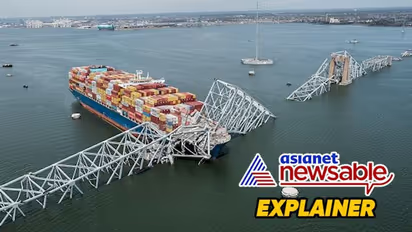Explained: How Francis Scott Key Bridge collapse may impact Indian importers and supply chain

Synopsis
The Francis Scott Key Bridge collapse in Baltimore, United States, has sent shockwaves through the Indian coal and petcoke markets, raising concerns about potential disruptions and price impacts along the supply chain.
The Francis Scott Key Bridge collapse in Baltimore, United States, has sent shockwaves through the Indian coal and petcoke markets, raising concerns about potential disruptions and price impacts along the supply chain. S&P Global Commodity Insights reports that the incident, caused by a vessel colliding with a supporting pylon, has resulted in the halt of navigation through Baltimore Harbor, a crucial node for coal exports.
India, a significant importer of US thermal coal, is preparing for supply chain difficulties following the bridge collapse. A trader based in the US predicts that the incident will impede shipments from Arch Coal and pose logistical challenges for Indian importers.
A broker told S&P, "The incident will restrict NAPP shipments from Arch Coal and create numerous problems in the supply chain for India. Possible effect on thermal coal to Europe. The bigger impact is India. Watch the petcoke prices jump!"
The trader cautioned about possible price spikes in petcoke, a coal refining byproduct, which might exacerbate pressure on India's energy markets.
Yet, views within the Indian market diverge on the degree of pricing effects.
An Indian trader expressed doubt about substantial disruptions, noting that key suppliers such as Consol and Arch had not invoked force majeure.
Nonetheless, worries persist regarding potential coal shipment delays and the resulting strain on India's energy sector.
India's dependence on imported coal is substantial, and any disturbances in the global supply chain can have extensive ramifications.
The Indian trader told ANI, "The authorities will take 6-7 days to assess how much debris is there from the incident and how much draft is available because if the draft is low then it could be a problem. The authorities may take 10-15 days to clear out the debris, so it means no ship movement during this period."
The port of Baltimore, a vital loading point for US thermal coal exports, is essential in fulfilling India's energy requirements.
Given the suspension of navigation through Baltimore Harbor, exploring alternative routes and logistical adjustments becomes imperative to maintain a consistent coal supply to India.
While certain market participants expect short-term price fluctuations following the incident, others suggest that the overall impact on coal prices might be contained if the waterway is reopened promptly.
However, the situation is still evolving, and Indian stakeholders are vigilantly tracking developments to gauge potential ramifications for energy markets.
While authorities strive to evaluate and remove the debris from the collapsed bridge, Indian coal and petcoke importers are preparing for possible disruptions in their supply chains.
Given the significance of India's energy security, efforts are concentrated on identifying alternative measures to alleviate the effects of the Baltimore bridge collapse on the nation's energy sector.
Stay updated with the Breaking News Today and Latest News from across India and around the world. Get real-time updates, in-depth analysis, and comprehensive coverage of India News, World News, Indian Defence News, Kerala News, and Karnataka News. From politics to current affairs, follow every major story as it unfolds. Get real-time updates from IMD on major cities weather forecasts, including Rain alerts, Cyclone warnings, and temperature trends. Download the Asianet News Official App from the Android Play Store and iPhone App Store for accurate and timely news updates anytime, anywhere.